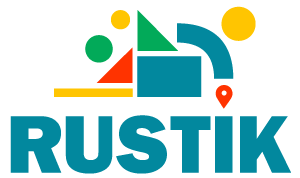To facilitate achieving the different goals, the project activities are structured across seven Work Packages.
WP1 Conceptualising functional rural areas, transition, and resilience of rural areas
- To define the methodological framework for analysing the diverse functional rural areas
- To identify variables, indicators, and information needs for the analysis of the three transition themes
- To analyse the resilience capacity of the diverse functional rural areas and how they respond to the different transitions
WP2 Co-design of data collection approaches, databases, and RUSTIK information system
• To provide suitable data for the analysis of rural functionalities, transitions, and resilience.
• To analyse data and make the results available to rural actors and other stakeholders.
• To contribute to a European-level database with common indicators.
• To provide databases on a regional and local level that are integrated into existing portals and maintenance protocols, as well as correspond to legal and financial issues.
WP3 Implementing Living Labs in 14 Pilot Regions
• To evaluate, test, and refine enhanced methods for sourcing, using and collating relevant data, information and analytical approaches to better understand and support the needs of functional rural areas and transition challenges, via participatory co-learning within 14 Living Labs in ten countries across Europe.
• To analyse how best policy and EU data platforms, tools, and resources can support local actors and generate lessons to inform future Regional, national, and EU policies, and their data resources/indicators and monitoring requirements, to support resilient rural transitions and rural proofing.
• To facilitate, coordinate and oversee the successful functioning of 14 Living Labs so they achieve objectives 1 and 2, through sustained engagement and co-innovation in practice and research.
WP4 Evidence and Indicators in Practical Strategy & Policy Implementation
- To investigate policy frameworks and coordination mechanisms in the 14 Living Labs (LLs), and their place-based responses to the main transition processes
- To support the LLs by providing conceptual frames and common tools for assessing policy landscapes, the embedded intervention logics, the associated evidence base, and for experimenting with distributed rural proofing approaches
- To illustrate, through a cross-national comparison the opportunities and challenges involved in promoting more evidence-based, place-based, integrated and tailored policies, strategies and governance frameworks
- To assess the capacity to benchmark, with novel indicators, rural, climate and environmental policies in respect to well-being, quality of life and attractiveness
- To identify implied concepts of functional geography associated with specific policies, and in different localities and governance contexts
WP5 Refined understanding of rural dynamics, impact assessment, and conclusions
1. To synthesize place-specific knowledge experience, transition narratives, and policy assessment to enhance strategy development to support the revitalization of basic conditions and processes for vibrant, inclusive, and sustainable rural regions in the long-term
2. To provide a framework to assess the scale, interrelations, actors, and dynamic evolvement of relevant action on all dimensions of transition.
3. To explore the relevance and implications of the diversity of rural places and regions for impending transition and its implications for securing services provided by functional rural areas.
WP6 Dissemination, exploitation, and communication
1. To maximize the impact of RUSTIK with an overall strategy of communication, dissemination, and exploitation.
2. To disseminate, promote, and connect the project results and facilitate the dialogue with stakeholders and participation in existing European networks.
3. To link RUSTIK with existing networks, projects, and initiatives to promote an effective and efficient transfer of knowledge, gathering a wide set of relevant stakeholders.
4. To develop an Exploitation Plan to promote replicability, long-term use and transferability of results.
WP7 Project management, administration, and coordination
1. To successfully implement the project activities and delivery of project outputs through proper targeting as well as good coordination among partners and facilitating collaboration with other projects and initiatives.
2. To manage efficiently the project through administration and reporting as well as safeguarding a sound financial monitoring and reporting of all activities.
3. To comply with research ethics and data management standards in all project-related activities.
4. To monitor the project progress and identify and manage potential risks.
